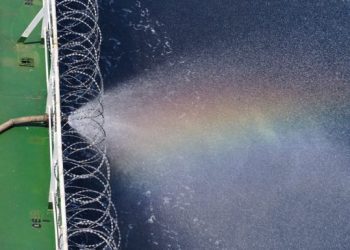Although all lights are shed on COVID-19, let’s not forget that last year the long anticipated IMO Sulphur cap became effective. Now, after one year of implementation, it is time to come to conclusions; in that regard, in our Sea Sense column, in association with The North of England P&I Club, we ask global experts to make their assessment whether we succeeded or not:
To date, has enforcement of the IMO global fuel sulphur cap been successful?
 George Teriakidis George TeriakidisArea Manager, East Mediterranean & Black Sea, DNV GL Hellas S.A. |
 Bill Stamatopoulos Bill StamatopoulosBusiness Development Manager South Europe, Bureau Veritas |
|
| Yes. Despite all the concerns and the challenging task of preparing the entire fleet for an almost simultaneous fuel switch, the transition has been smooth. There have been indeed reported increased cases of quality problems with fuels, as well as machinery issues that are related to fuel quality as well as scrubber failures. Except only a handful of serious cases, there have not been major disruptions due to fuel availability or any major safety incidents. This can be attributed to good preparation of vessels, crew training and engagement by all stakeholders when problems occurred. Overall, the shipping industry has successfully managed this challenging transition, although certain minor issues still remain. | Yes, the enforcement of the global fuel sulphur cap has been successful. The guidance issued by IMO and other stakeholders so as to explain the rationale of this change and to enhance preparedness was very effective. This new era marked a significant milestone to improve air quality, preserve the environment and protect human health. Ship operators and fuel suppliers have adapted either by the use of VLSFO or by the use of exhaust gas cleaning systems. Monitoring compliance and enforcing the new limit, falls under the remit of Governments and national authorities of Member States that are Parties to MARPOL Annex VI. Flag and port State Controls are ensuring that ships are compliant via document checks, fuel samples, targeting mechanisms, remote sensing and use of sniffers | |
 Mark Smith Mark SmithLoss Prevention Executive, The North of England P&I Club |
 Dr Edmund Hughes Dr Edmund HughesDirector, Green Marine Associates Ltd. |
|
| No. Port state control officers (PSC) may not have visited as many vessels as expected after IMO 2020 because of the global pandemic. Inspections and fuel oil sampling can’t be carried out behind a computer screen so have we really seen the levels of enforcement we expected? I doubt it. If owner’s fuel test analysis returns 0.54% s content or above, it’s clear cut! Flag state and suppliers amongst other parties are notified. Currently, an in-use or onboard sample testing between 0.51% and 0.53 % sulphur content could be deemed non-compliant by the port state control authorities that do not apply the amended verification procedure (Circular MEPC.1/Circ.882). However, test methods have limitations with regards to their accuracy and a single test result of 0.53% sulphur does not conclusively prove that a fuel has failed to meet the 0.50% sulphur limit. The amended procedure recognises single test reproducibility and allows a test margin of up to 0.53% sulphur. The aim of IMO 2020 enforcement should be to penalise ship-owners and charterers who are not making any effort to comply. We need ship-owners to have confidence in the system and openly report to the IMO GISIS module via their flag state to get a true measure of how many tests are returning above 0.50%. If PSC and Flag states act uniformly, we’d see less ship-owners with good intentions being penalised for fuels in the above range. It’s not just the fines but the reputational damage of a PSC detention is long lasting! | Maybe. It is difficult to assess whether enforcement of the 0.50% global sulphur limit has been successful due to the impact of the COVID-19 pandemic which has affected global trade with a knock-on effect of depressing shipping activity. As a consequence global bunker fuel oil demand has been impacted leading to a significant narrowing of the price spread between HFO and VLSFO so providing less of an economic incentive for ship operators to not comply. Furthermore, with the carriage ban of non-compliant fuel oil only coming into force on 1 March 2020, COVID-19 has limited the scope of enforcement action by port State control authorities thus potentially reducing insight into the rate of compliance and the scale of any non-compliance. | |
 Charalampos Giantzikis Charalampos GiantzikisTechnical Manager, Arcadia Shipmanagement Co Ltd |
 Fotis N. Dalmyras Fotis N. DalmyrasTechnical Director, Andriaki Shipping Co. Ltd. |
|
| Yes, we can say that the IMO global sulphur cap has been successful. We read that IMO had only 55 reported cases of non availability, globally and had no reports of safety issues linked to compliant fuel. Regarding violations because of the Covid-19 pandemic, PSC inspections for compliance were very limited.From the operators side fuel analysis shows sulphur content values being between 0.50 and 0.53 while same is 0.50% or lower on the BDN. Main issues are still stability and storage and there are cases of sludging and filter clogging.Last but not least cylinder lubrication presents a challenge to the operators, since they have to decide themselves on issues like TBN and piston ring composition. | Yes, generally we can say that the transition to Very Low Sulphur Fuels (VLSFO) has been successful. Andriaki was among the Tanker Operators that selected not to install SOx Scrubbers, but changed over to VLSFOs. This required significant preparatory work and good planning, so as to minimise HFO inventories by the end of 2019 and to accommodate the VLSFO in as clean storage tanks as possible. However, operation with VLSFOs has not been trouble free. Problems related to fuel injection systems and pistons/liners wear have been experienced, which may be attributed, among other reasons, to the new type of fuels, while ongoing root cause analyses have not clearly indicated that. Continuous monitoring, adoption of Engines manufacturers’ recommendations and correct selection of appropriate lubricants and feed rates are prerequisites for reduction of operational problems and downtime. | |
 Panos Kourkountis, Panos Kourkountis, Technical Director, Sea Traders SA |
 Søren Høll Søren HøllCEO, KPI OceanConnect |
|
| Yes. In 2019 the preparations for the enforcement of the 2020 fuel cap were overwhelmed by the uncertainties regarding the availability of compliant fuel, the price difference between new and old fuels and the quality issues of the new fuels. Many companies bet on price differences and decided to tackle the uncertainties by installing on their ships Exhaust Gas Scrubbers. Pessimists predicted that the regulation would wreak havoc on fuel supply chain. However, availability of the low Sulphur fuel was not a problem. The gap between the cost of high and low Sulphur was reduced within the first 2-3 months of 2020 and the price difference does not justify investment in scrubbers. The quality issues of the new fuels do not surprise anyone. Poor quality fuels have plagued the shipping industry for quit a long time. Issues of compatibility and stability and the matching of fuels with lubricants were added to the existing problems but the matter seems to be under control. | Yes. When IMO 2020 first entered into force, there were concerns that there wouldn’t be enough compliant fuels to meet both land and maritime demand. But the reality is that there were only 55 FONARs filed to the IMO in 2020. And, perhaps more significantly, it has not received any reports of safety issues linked to VLSFO since the rules came into effect. The bigger concern for our shipowner and operator clients in the last 18 months has been inadvertent non-compliance, and we have worked consultatively with them and our fuel suppliers to ensure that any bunkers we deliver meet the standards of ISO 8217 and PSC. Any bunker partner that doesn’t appreciate the risks of marginally off-spec fuels is taking a big gamble with their customers’ balance sheets and reputations. | |































































